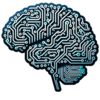This article has multiple issues. Please help improve it or discuss these issues on the talk page. (Learn how and when to remove these template messages)
|
Artificial intelligence (AI) in mental health refers to the use of AI, computational technologies and algorithms to supplement the understanding, diagnosis, and treatment of mental health disorders.[1] AI is becoming a ubiquitous force in everyday life which can be seen through frequent operation of models like ChatGPT.[2] Utilizing AI in the realm of mental health signifies a form of digital healthcare, in which, the goal is to increase accessibility in a world where mental health is becoming a growing concern.[3] Prospective ideas involving AI in mental health include identification and diagnosis of mental disorders, explication of electronic health records, creation of personalized treatment plans, and predictive analytics for suicide prevention.[3] [4] Learning how to apply AI in healthcare proves to be a difficult task with many challenges, thus it remains rarely used as efforts to bridge gaps are deliberated.[3]
| Part of a series on |
| Artificial intelligence |
|---|
- ^ Mazza, Gabriella (2022-08-29). "AI and the Future of Mental Health". CENGN. Retrieved 2023-01-17.
- ^ King, Darlene R.; Nanda, Guransh; Stoddard, Joel; Dempsey, Allison; Hergert, Sarah; Shore, Jay H.; Torous, John (30 November 2023). "An Introduction to Generative Artificial Intelligence in Mental Health Care: Considerations and Guidance". Current Psychiatry Reports. 25 (12): 839–846. doi:10.1007/s11920-023-01477-x. ISSN 1523-3812. PMID 38032442.
- ^ a b c Lu, Tangsheng; Liu, Xiaoxing; Sun, Jie; Bao, Yanping; Schuller, Björn W.; Han, Ying; Lu, Lin (14 July 2023). "Bridging the gap between artificial intelligence and mental health". Science Bulletin. 68 (15): 1606–1610. doi:10.1016/j.scib.2023.07.015. PMID 37474445.
- ^ Shimada, Koki (2023-11-29). "The Role of Artificial Intelligence in Mental Health: A Review". Science Insights. 43 (5): 1119–1127. doi:10.15354/si.23.re820. ISSN 2329-5856.
© MMXXIII Rich X Search. We shall prevail. All rights reserved. Rich X Search

